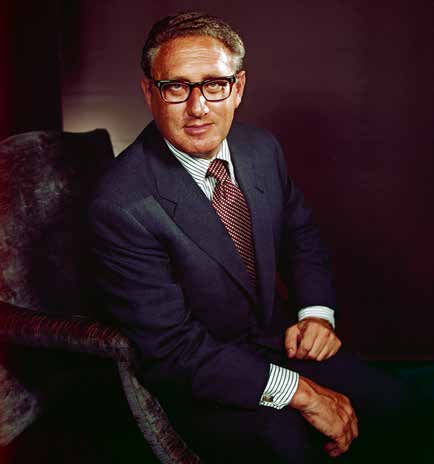On my desk in my study where I am writing this article is a photograph of Henry Kissinger on which he has written, ‘To Andrew, from his friend and admirer, Henry.’ Please therefore do not expect this ‘Happy 100th Birthday’ article to be entirely objective. I nonetheless do believe that for such an extraordinary man to reach his centenary is an event that should be celebrated far beyond just his friends and family
Much of global history over the last eight years has been bound up with Dr Henry Kissinger, and vice versa. He was born in 1923, the year of the great German inflation, and thankfully escaped that country in 1938, and almost certain death in the Holocaust. He returned to Germany as an American soldier at the end of the Second World War, hunting Nazi war criminals. He was at the cutting edge of nuclear war theory in the 1950s, and served as Richard Nixon’s Secretary of State and National Security Adviser when he ended the Vietnam War (for which Henry won the Nobel Peace Prize), invented ‘shuttle diplomacy’ to end the Yom Kippur War in the Middle East, opened up Red China to the rest of the world, and tried to deter the global march of Soviet Communism.
Since leaving office in 1977, Henry has chaired the 9/11 Commission and been the world’s foremost commentator on international affairs, as well as becoming the author of over a dozen books, the latest of which was published when he was 99. Almost everything he has done in his career has been highly controversial – except his marriage to the lovely and delightful Nancy – but no-one can deny that his life has been intimately bound up with the destinies of our planet.
Presidents, premiers and CEOs have flocked to him for advice, yet for all his eminence, Henry is an immensely approachable and even jolly figure, at least once one has got past the shock of a voice that sounds like a cement-mixer undergoing serious mechanical problems. His twinkling eyes under their heavy hoods display a love of mischief, good-natured teasing, high-level gossip, but above all of serious intellectual discourse.
Genuine intellectuals are surprisingly rare amongst the world’s top decision-makers, but Henry is undoubtedly one such, although he does not belabour the fact. Here is a man who has read and followed the precepts of Immanuel Kant, and as far as possible tried to put them into practice in his policies of Détente based upon Realpolitik.
There is also of course his superb sense of humour, which is always on display and entirely undimmed at the age of 100. It was he who famously pronounced ‘Power is the ultimate aphrodisiac’, which I’m certain he said with a smile on his face, and that disputes between academics were so vicious ‘because the stakes are so low’. His stance on the long-running Iran-Iraq War of the 1980s was as pithy as it was insightful: ‘A pity they both can’t lose.’ Readers of his books will delight in his aphorisms and apercus long after he has gone to the great West Wing in the sky.
Henry’s legacy will provide grounds for debate for decades, perhaps even centuries, to come. He will be praised and blamed for the great policy decisions that he took with Richard Nixon and Gerald Ford at a time when, we should recall, no-one could have guessed that the Berlin Wall would fall only 12 years after Henry left office. The Nixon Administration’s decision in 1973 fully to engage with China and bring it into the international system will be judged ultimately on the way that country behaves over the coming decades.
As Henry looks back on his long, consequential and eventful life, he will doubtless recognise that the driving force of this 15 year old Jewish immigrant to America in 1938 was to try to build a world where superpowers were able to co-exist peacefully, while the forces of totalitarianism were kept in check by the democracies. He is needed today more than ever.
